InTveresting Times: An AfTver Action Report
- Thread starter Fyregecko
- Start date
-
We have updated our Community Code of Conduct. Please read through the new rules for the forum that are an integral part of Paradox Interactive’s User Agreement.
You are using an out of date browser. It may not display this or other websites correctly.
You should upgrade or use an alternative browser.
You should upgrade or use an alternative browser.
If Aleksandr proves half the man of his father (which may be quite difficult considering how, uh, 'well endowed' in terms of ability his father was), he will be sure to finally defeat the Golden Horde! Good stuff as ever.
Congratulations too, as I have named you the new WritAAR of the Week!
Congratulations too, as I have named you the new WritAAR of the Week!
@ Septimus I : Prude  But yes, one area in which young Aleksandr was a bit of a disappointment to his father. They were reconciled before the end, though.
But yes, one area in which young Aleksandr was a bit of a disappointment to his father. They were reconciled before the end, though.
@ loki100 : His Administrative talents certainly won't do any harm. His dad was a good soldier and diplomat, but I don't think either military prowess or Boundary Disputes will do me much good for the next while, so I'll take the enhanced tax income. And I'm about to core Vyazma, which will increase my income by...by...will increase my income.
@ 4th Dimension : I bloody hope so, I've been lucky to get two very good kings in a row (meaning that the next will be an idiot, no doubt...when can I get Republics?). Can't remember if Admin helps your Spy chances...not that I can afford them at the moment, but they are one of the few weapons that might help me against the Horde. A bit.
@ Omen : That's the angle taken by the official histories as well. It all makes sense. And yes, Aleksandr is a more talented scholar than his predecessors, which will be good for the treasury. Although you may find him to be a bit...well, you'll find out once I play the next section :S
And yes, Aleksandr is a more talented scholar than his predecessors, which will be good for the treasury. Although you may find him to be a bit...well, you'll find out once I play the next section :S
@ GoldenKhan : Cheers mate Glad you're enjoying it, and hope that I can keep doing...whatever it is that I'm doing!
Glad you're enjoying it, and hope that I can keep doing...whatever it is that I'm doing!
@ morningSIDEr : Wow! Thanks a lot Never expected that. And now I will keep writing updates and awarding it to myself each week because of their awesomeness. That's how this works, right?
Never expected that. And now I will keep writing updates and awarding it to myself each week because of their awesomeness. That's how this works, right?
@ All:
I haven't started playing the next section, yet, because I'm trying to come up with a plan for the way forward. Like I said before, I don't mind a challenge, but the Horde situations is stretching the boundaries of 'Fun'. I'm not sure if the last update made it clear, but the current situation is: GH > 100, 000 soldiers. Tver: None. Zero. Total wipeout. Even better, there are six regiments of Ryazanian Nationalists besieging Tver, and another group about to enter Rzhev (where I built an Armoury to reduce recruitment costs), although I think the Horde are about to tidy that one up for me as they stomp across my territory - without Military Access, as usual (why can't I do that to them?), on their way to attack Denmark's Baltic holdings. Oh, and I'm War Leader against Novgorod as well, though Riga are taking care of them at the moment.
I need some thoughts and opinions on what I can do next, as it's becoming incredibly repetitive. I've given very strong thought to taking artificial measures to hamstring the GH: cheating, I know, but they're currently enjoying the advantages of being Steppe Nomads (massive armies) without the disadvantages (being baw-deep in revolts).
They should be being ripped apart by infighting, swimming in Nationalists, Patriots, Orthodox Zealots, Catholic Zealots, and their own Pretenders. But they aren't. At all. They have twice as many troops as any of the Europeans, even Bohemia (still Emperor) and Austria. Even Ming have 30k less troops! The real master-stroke though, as I showed earlier, is the vassalisation of Georgia in such a shape that prevents them from fighting the (very strong) Ottomans, meaning they can unleash their full might on (current regular victims) Poland-Lithuania, Denmark-Sweden-Norway, and...me. And it's not fun. At all.
I'm not 'supposed' to take any artificial action here, but the Horde is not supposed to be invincible either. Any thoughts as to action that I can take and, just as importantly, should be allowed to take - both 'ethical' and 'unethical', is greatly appreciated, because I have strongly considered trying to learn how to use cheats - not to enhance myself (I want all of eastern Europe to belong to European countries, dammit, not necessarily me!), but to undermine them advance. I would never do anything like giving myself free money or troops, I purely want to see the Horde become a challenge, but not an all-consuming, literally unstoppable monster.
Sorry to end on such a negative note (especially after such a nice award ), and I'm always open to suggestions as to what I can do without resorting to desperate, unethical tactics, but I need suggestions. Any bloody suggestions.
), and I'm always open to suggestions as to what I can do without resorting to desperate, unethical tactics, but I need suggestions. Any bloody suggestions.
@ loki100 : His Administrative talents certainly won't do any harm. His dad was a good soldier and diplomat, but I don't think either military prowess or Boundary Disputes will do me much good for the next while, so I'll take the enhanced tax income. And I'm about to core Vyazma, which will increase my income by...by...will increase my income.
@ 4th Dimension : I bloody hope so, I've been lucky to get two very good kings in a row (meaning that the next will be an idiot, no doubt...when can I get Republics?). Can't remember if Admin helps your Spy chances...not that I can afford them at the moment, but they are one of the few weapons that might help me against the Horde. A bit.
@ Omen : That's the angle taken by the official histories as well. It all makes sense.
@ GoldenKhan : Cheers mate
@ morningSIDEr : Wow! Thanks a lot
@ All:
I haven't started playing the next section, yet, because I'm trying to come up with a plan for the way forward. Like I said before, I don't mind a challenge, but the Horde situations is stretching the boundaries of 'Fun'. I'm not sure if the last update made it clear, but the current situation is: GH > 100, 000 soldiers. Tver: None. Zero. Total wipeout. Even better, there are six regiments of Ryazanian Nationalists besieging Tver, and another group about to enter Rzhev (where I built an Armoury to reduce recruitment costs), although I think the Horde are about to tidy that one up for me as they stomp across my territory - without Military Access, as usual (why can't I do that to them?), on their way to attack Denmark's Baltic holdings. Oh, and I'm War Leader against Novgorod as well, though Riga are taking care of them at the moment.
I need some thoughts and opinions on what I can do next, as it's becoming incredibly repetitive. I've given very strong thought to taking artificial measures to hamstring the GH: cheating, I know, but they're currently enjoying the advantages of being Steppe Nomads (massive armies) without the disadvantages (being baw-deep in revolts).
They should be being ripped apart by infighting, swimming in Nationalists, Patriots, Orthodox Zealots, Catholic Zealots, and their own Pretenders. But they aren't. At all. They have twice as many troops as any of the Europeans, even Bohemia (still Emperor) and Austria. Even Ming have 30k less troops! The real master-stroke though, as I showed earlier, is the vassalisation of Georgia in such a shape that prevents them from fighting the (very strong) Ottomans, meaning they can unleash their full might on (current regular victims) Poland-Lithuania, Denmark-Sweden-Norway, and...me. And it's not fun. At all.
I'm not 'supposed' to take any artificial action here, but the Horde is not supposed to be invincible either. Any thoughts as to action that I can take and, just as importantly, should be allowed to take - both 'ethical' and 'unethical', is greatly appreciated, because I have strongly considered trying to learn how to use cheats - not to enhance myself (I want all of eastern Europe to belong to European countries, dammit, not necessarily me!), but to undermine them advance. I would never do anything like giving myself free money or troops, I purely want to see the Horde become a challenge, but not an all-consuming, literally unstoppable monster.
Sorry to end on such a negative note (especially after such a nice award
decrease their stability to -3 and kill off their current ruler. you can also halve their army for funzies
There's nothing wrong with losing a little territory. The Horde won't go all-out and annex you completely. Once they've snaffled a province or two, or even none at all, they'll be willing to take peace. You could always pay them some tribute.
I'll second the paying tribute suggestion. I just finished a Poland into space game (that almost ended up being a WC) and my first move was to pay tribute to the Golden Horde. What I did with my armies instead was to force a PU on Bohemia. I think this was a really good deal. Eventually the Golden Horde will run out of steam due to tech disadvantage and that's when to strike! Also, for some reason in my game they disbanded or lost their entire army... maybe you'll have the same good fortune. It would be a shame to let an AAR this fun get ruined by the Golden Horde.
I played a similarly frustrating game recently as Ryazan (though sans the Technicolour Coat and the Shaft of Light), and yes, the Hordes were just ridiculous.
1. I kept spending culture on advisors to be sold off on spring auctions, a great way for a Euro-Minor to make money.
2. I did resort to tribute when I had to.
3. I picked MORE COLONISTS as my second idea, so that eventually I could take land off the horde.
Amazingly, by 1550 I had nearly all of European Russia and formed the country with three coastlines from the get-go, but in the meanwhile my inflation has gotten into ridiculous territory. Russian minors are difficult. But also good comedy fodder
1. I kept spending culture on advisors to be sold off on spring auctions, a great way for a Euro-Minor to make money.
2. I did resort to tribute when I had to.
3. I picked MORE COLONISTS as my second idea, so that eventually I could take land off the horde.
Amazingly, by 1550 I had nearly all of European Russia and formed the country with three coastlines from the get-go, but in the meanwhile my inflation has gotten into ridiculous territory. Russian minors are difficult. But also good comedy fodder
Heh. You're all correct, of course. I'm just being weak. I should stick it out a bit longer - at this rate I'm probably going to start disbanding my armies every five years, unless I can find a safe haven to send them into until the monster will accept peace. It has so far refused to accept Tribute in any situation where it wouldn't also accept Concede Defeat, and while paying the minimum tribute might be better long-term, I'm sure you can understand that the chance to avoid it is rather more tempting (even 0.1 / month would be a notable hit for me at the moment).
Anyway, I shall soldier on. Still at war with Novgorod and dealing with ex-Russian states' Nationalists. I really need to build a University and send all the local Nationalists to it, since they still haven't worked out where Ryazan is...what Tech Level do you have to be to invest in Road Signs?
Anyway, I shall soldier on. Still at war with Novgorod and dealing with ex-Russian states' Nationalists. I really need to build a University and send all the local Nationalists to it, since they still haven't worked out where Ryazan is...what Tech Level do you have to be to invest in Road Signs?
Last edited:
Episode X: Tvervolve Or Die
The group of riders, escorted by heavily armoured cavalry, arrived at the outskirts of the city of Tver, capital of the largest of the Russian principalities. They had ridden for several weeks from the northern edge of the country, the frozen wastes of Archangelsk, attending the erection of a great monument to the fallen King of Tver, Aleksandr II Rurikovich. The largest town in the region had been renamed Aleksandrograd in honour of the mighty warrior and statesman.
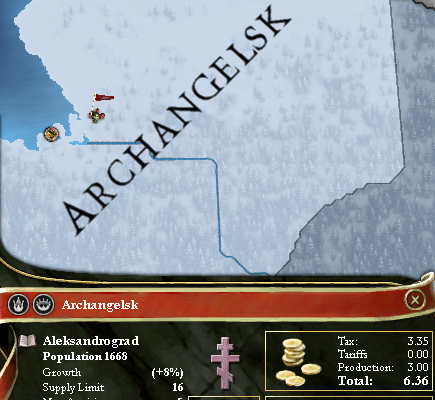
The new King, Aleksandr, rode in a great carriage near the front of the column. Aleksandr III did not share his father’s passion for riding, preferring the warmth of the carriage where he was able to read and converse in peace. The young man had the black hair of his mother, and wore a pair of spectacles perched on his nose, finely-cut glass designed to make up for his poor eyesight, a problem exacerbated by his insatiable appetite for reading and administration.
The days of Aleksandr the Bear were gone. The days of Aleksandr the Clerk had arrived.
They could not yet enter the city itself, however. Tver was surrounded by hordes of armed men shouting in unison, demanding the freedom of their country. The fact that their country, Ryazan, had lain around eighty kilometres east of the city they were currently besieging did not seem to bother them. A similar group, with similar demands, had surrounded the Tverian city of Kholm, further to the west. This had proven to be a common problem for Tver in recent decades: every Russian nationalist or patriot who rose against the Golden Horde seemed to become disoriented, weave his or her way into Tverian territory, and lay siege to her cities with great vigour, like a great aunt, well-marinated in medicinal spirits, crashing into her niece’s wedding and making enthusiastic advances on the groom.
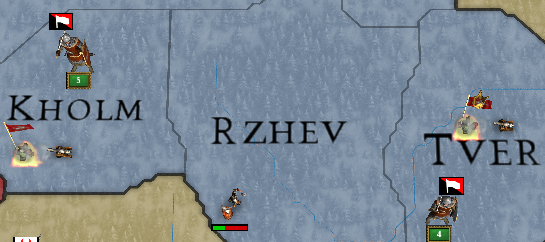
Interesting news had reached the column from the northern frontier, and good news too: the war with the opportunistic Novgorod was over in rather unexpected fashion.
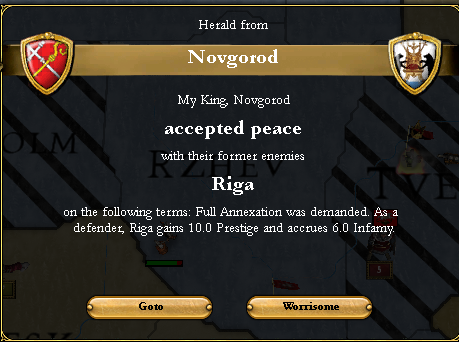
The young king rode in the carriage with two other men. One was Bronisław Dobczyński, his father’s chief advisor. The other was a man whom Dobczyński had met in Kraków upon the advice of the late Aleksandr II. His name was Roman Vladimirov, a native of Tver who had achieved fame in Lithuania as a ruthless but effective banker, and in far-off Scotland as an optimistic patron of local sports.
Vladimirov had been taken on as Aleksandr’s chief financial advisor, as well as a man with a network of international contacts. In coming years, he could well prove to be a very useful man. He was possessed of a flamboyant manner which, Dobczyński thought, nicely complimented Aleksandr, who appeared to have had most of his social skills amputated in a botched circumcision.
Vladimirov’s first act had been to streamline the running of Tver’s treasury, and he was unafraid of allowing the Principality’s Mint to produce more currency, even at the risk of inflation, to deal with short-term necessities. The army needed to be rebuilt, recruitment overseen by Dobczyński. Vladimirov, though, had recommended a general.
‘Hire Aleksandr Dyabrinsky!’ he urged the young king. ‘He was trained by a very great Scottish general whom I met on my travels.’
Dyabrinsky was duly taken on, and the newly-appointed General led the freshly equipped Royal Army of Tver into battle against the rebels who had taken over Kholm.
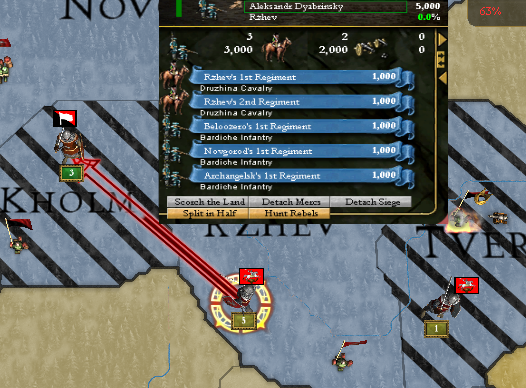
‘What was his name, this great Scottish general?’ asked Dobczyński.
‘Livingston. David Livingston.’
‘I think I know the name. Isn’t he famous for...’
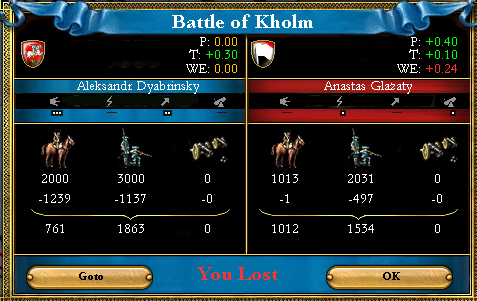
‘I stand corrected. It is like that time I tried to buy out the Central Bank of Riga using only a clever Archbishop’s disguise and a winning smile.’
‘They don’t know that you work for us now, do they?’
‘Oh, I’m sure they don’t.’
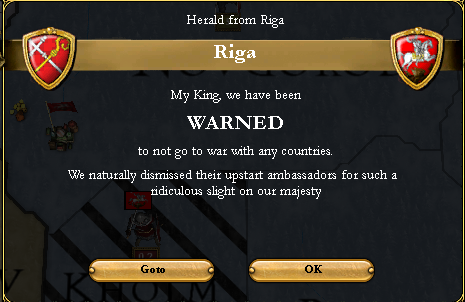
‘They’re getting confident’ mused Dobczyński, fidgeting with his sword. Aleksandr glared at him.
‘Must you?’
‘I always fidget with my sword on long journeys. Passes the time.’
‘In front of other people?’
‘You don’t?. Your father never minded. He used to play about with his sword as well.’
‘Well he is not here anymore and I am here and I am your new king and I will run this country and this carriage as I see fit do I make myself clear good.’
Dobczyński blinked, and ceased his fiddleage. Besides, his blade was in good condition. In need of a good firm polish, perhaps, but he could attend to that once they returned to Tver.
Eventually, a campaign to re-educate the Ryazanian Patriots convinced them that, being in the city of Tver, they were actually in the country of Tver as well. Diplomacy was triumphant.
Good news came from the southern territories, as Vladimirov’s administrative reforms had maximised local tax income in the Vyzama region. In addition, the people had finally accepted that being part of Tver was far preferable to the fate which lay just over the border in the lands controlled by the Golden Horde. Tver was a richer and more peaceful nation as a result. Vladimirov promised that Tver would be ‘champion nation of Europe’ within five years, and his maroon-clad supporters (maroon being one of the official colours of Tver, especially around its heart) eagerly awaited further developments.
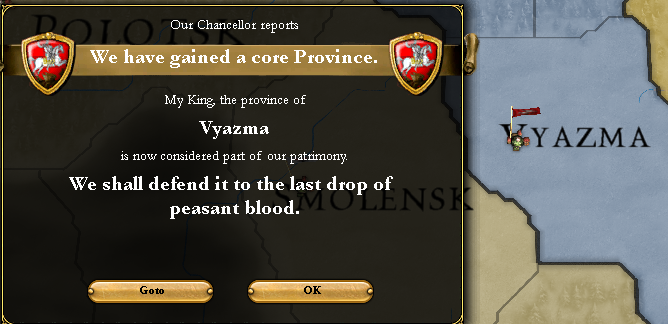
Not all was well, though: merchants in Novgorod were angered by Vladimirov’s interference, and played on his long association with Lithuania to denounce his practises as Pagan and ungodly.
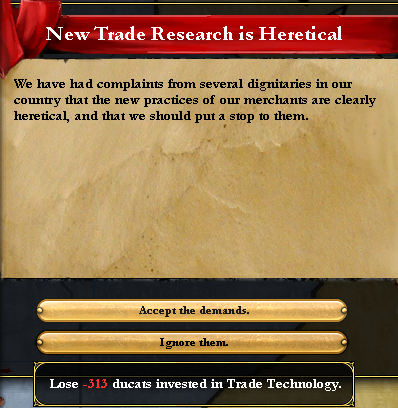
Further evidence of the madness created by modern trade practices could be observed to the west, as the King of Sweden decided to establish a major Centre of Trade to rival Antwerp and Venice in, as King Jan I of Poland described it, ‘the middle of flocking nowhere’.
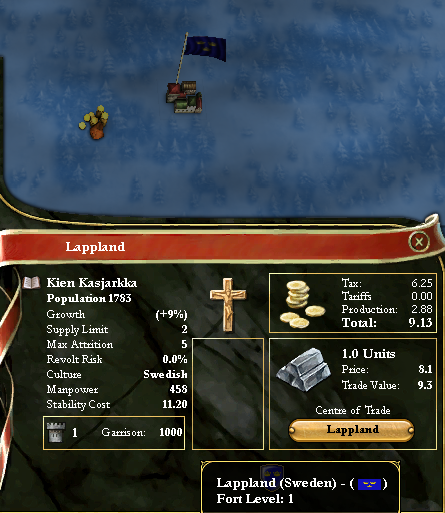
Vladimirov was s friend of the King of Sweden, though, and the King sent Tver annual friendship gifts of reindeer which wore gold chains and loose-fitting clothing.
Tver continued to establish itself as the educational centre of Russia, as more exchange students came to the capital in search of their own country. In many cases, a single lesson was insufficient to convince them as to the whereabouts of their homeland.
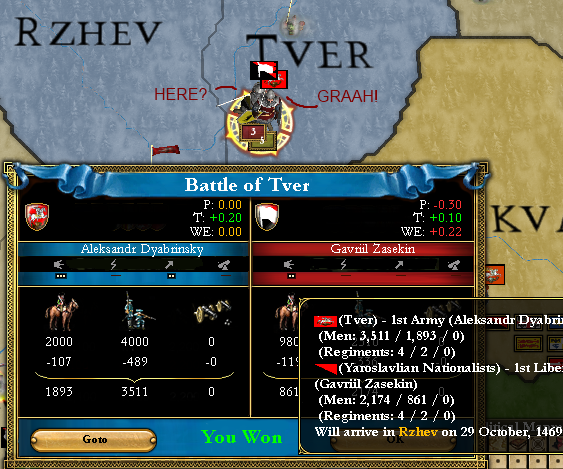
Around a year later, Dobczyński approached the King’s study to make his report.
‘Sir?’
‘What is it?’
‘Interesting development to the south, sir. The Horde has taken over the Dagestan region.’
‘And?’
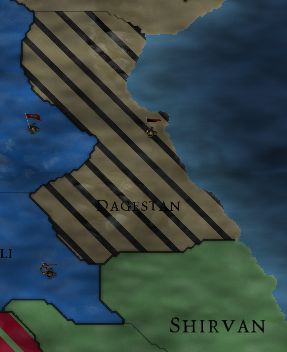
‘They’re now at war with the Ottoman Empire, sir. The first large, powerful opponent they have faced in decades.’
‘Excellent excellent good news very interesting I shall keep it in mind is there anything else?’
‘How do you feel about marriage, sir?’
‘A compact between two persons who wish to engage in a long-term relationship for reasons of mutual advantageousness and sometimes if they are lucky attraction why?’
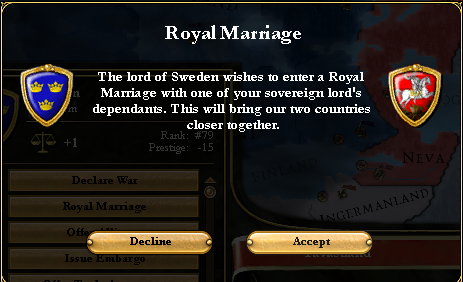
‘The King of Sweden suggests that you marry his daughter.’
‘Should I?’
‘She’s pretty. And a good listener.’
‘Is she interested in administration?’
‘Bordering on the fetishistic, sir.’
‘Then we marry tomorrow.’
The marriage was to be a long and surprisingly happy one: Princess Catherine was beautiful, patient, and shared Aleksandr’s obsession with mathematics. The relationship soon bore fruit.
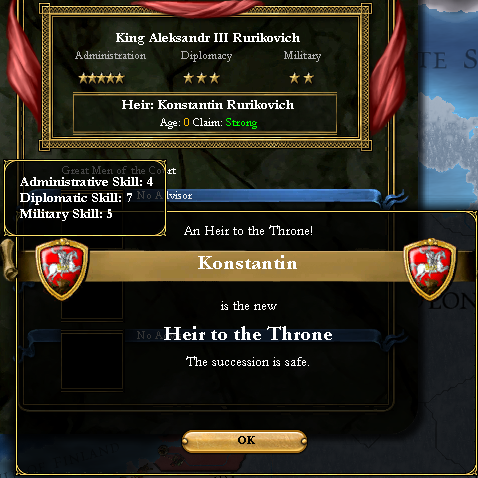
The King of Castille stopped by to join in the celebrations.
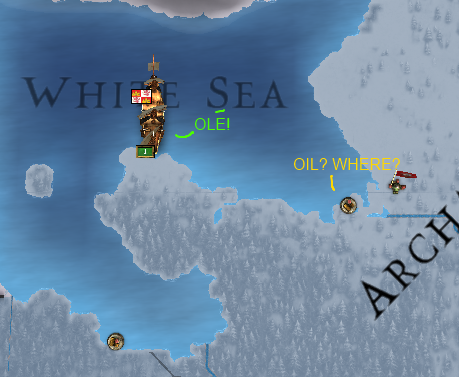
Aleksandr was largely uninterested in matters military, leaving the organisation of the army to Dobczyński and General Dyabrinsky, who was of great help to the Polish veteran: Dyabrinsky made suggestions, and Dobczyński did the opposite. Dobczyński continued the work of the king’s grandfather, Mikhael II: ‘more quality, less morons’ would continue to be a watchword for Tver, causing great discontent amongst the nobility, who mostly belonged in category two.
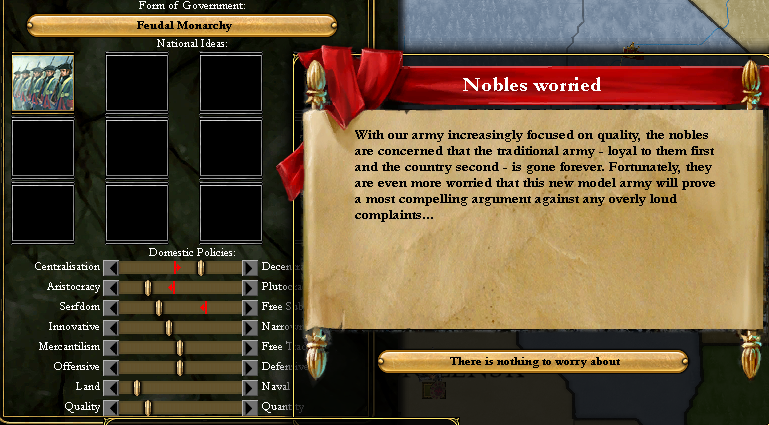
Aleksandr took a break from the harsh work of administering the kingdom by abolishing a country.
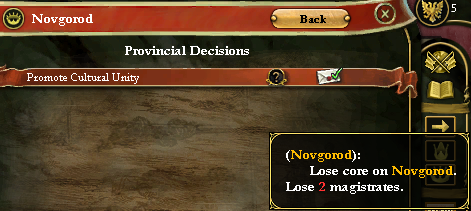
For weeks he slaved away at piles of documents, seeing only Dobczyński for updates and Vladimirov for advice on the economy. Even the Queen – and his young son, Konstantin – were to see him regularly. Eventually, overwork took its toll, and he was forced to rest.
Not trusting Tver’s newly-enriched merchant class, his First Minister instead delegated more power to the nobility, many of them scheming about the possibility that the king would not recover. While their hopes were to prove unfounded – Aleksandr returned from a three-week holiday in Aleksandrograd’s spas and saunas – the country was destabilised by uncertainty.
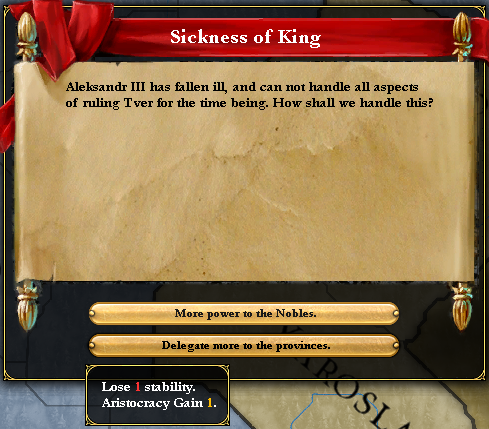
Upon returning, he was greeted by Dobczyński with some positive – though rather strange – news.
‘The Horde, sir. They’ve been defeated by the Ottomans.’
‘The war is over.’
‘Yes, sir, they have...’
‘That was a statement not a question Dobczyński which I thought would have been obvious although I realise that the circumstances are rather strange as I thought that the Horde refused to negotiate over territory and yet seem willing to cede Dagestan to the Ottomans very strange behaviour on their part.’
‘Yes, sir. Yes it is.’
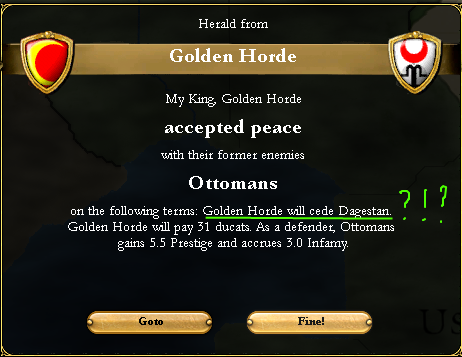
‘You have brought me this report for a reason what is it?’
‘You’re a new king, sir. You’ve had a strong start to your reign but you need to cement your position.’
‘Cement unknown quantity presumably some form of adhesive and yes I understand your meaning you believe that we can defeat them even though we have a much smaller army than them and our only recognised general is as useful as a glass hammer.’
‘Sir, they are on the retreat. They haven’t known defeat before. Their people see the weakness of their leaders! More rebels rise up against them every day. We may not get a better chance for decades, and the truce is about to expire again.’
‘You believe that we can attack them soon while they are still recovering an interesting proposition although the last time this was attempted it led to the death of my father.’
‘The Horde were rampant, sir, advancing. Their army has been almost halved.’
‘It is still far larger than any force than we can raise and if we fail we could lose the entire kingdom.’
‘At least let me send a spy into their territory, sir.’
‘A logical move very well make sure that he is not discovered.’
‘Yes, sir. Mr Vladimirov recommended a man. Trained in Scotland at the school of the great Jimmy McBond.’
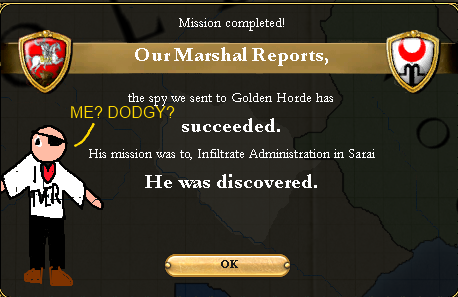
Dobczyński presented the king with the reports. The spy they had sent to Sarai had returned. Only second class postage – times were apparently even harder in the Horde lands than the reports suggested.
‘We’re raising new regiments, sir, the new armoury complex in Tver herself is complete.’
‘Instruct all future spies not to wear eyepatches.’
‘It’s a rules of war issue, sir. It’s like wearing the enemy’s uniform in battle.’
‘Tell the army to start wearing the enemy uniform in battle I do not work in the legal business Mr Dobczyński I work in the business of results do I not Mr Vladimirov?’
‘Yes, sir!’
‘Talking of which, Mr Vladimirov’, interjected Dobczyński, ‘will you make sure that our soldiers are actually paid this month?’
‘They are still complaining? Yes, yes, of course! I always keep my word. I want to stay rich.’
‘Very well then gentlemen the truce with the Horde is nearly expired and we are ready for battle Mr Dobczyński?’
‘Yes, sir?’
‘Sir?’
‘What would my father have done?’
‘Strode out in front of the assembled army, ripped off what little clothing he was wearing and given a baleful howl that shook the very foundations of the city, sir.’
‘I thought as much and while I will not do the same thing and we often disagreed I hope that I can succeed where he was less successful.’
‘God willing sir, we will.’ Dobczyński drew his sword. ‘General Dyabrinsky! Prepare your men!’
The group of riders, escorted by heavily armoured cavalry, arrived at the outskirts of the city of Tver, capital of the largest of the Russian principalities. They had ridden for several weeks from the northern edge of the country, the frozen wastes of Archangelsk, attending the erection of a great monument to the fallen King of Tver, Aleksandr II Rurikovich. The largest town in the region had been renamed Aleksandrograd in honour of the mighty warrior and statesman.

The new King, Aleksandr, rode in a great carriage near the front of the column. Aleksandr III did not share his father’s passion for riding, preferring the warmth of the carriage where he was able to read and converse in peace. The young man had the black hair of his mother, and wore a pair of spectacles perched on his nose, finely-cut glass designed to make up for his poor eyesight, a problem exacerbated by his insatiable appetite for reading and administration.
The days of Aleksandr the Bear were gone. The days of Aleksandr the Clerk had arrived.
They could not yet enter the city itself, however. Tver was surrounded by hordes of armed men shouting in unison, demanding the freedom of their country. The fact that their country, Ryazan, had lain around eighty kilometres east of the city they were currently besieging did not seem to bother them. A similar group, with similar demands, had surrounded the Tverian city of Kholm, further to the west. This had proven to be a common problem for Tver in recent decades: every Russian nationalist or patriot who rose against the Golden Horde seemed to become disoriented, weave his or her way into Tverian territory, and lay siege to her cities with great vigour, like a great aunt, well-marinated in medicinal spirits, crashing into her niece’s wedding and making enthusiastic advances on the groom.

Interesting news had reached the column from the northern frontier, and good news too: the war with the opportunistic Novgorod was over in rather unexpected fashion.

The young king rode in the carriage with two other men. One was Bronisław Dobczyński, his father’s chief advisor. The other was a man whom Dobczyński had met in Kraków upon the advice of the late Aleksandr II. His name was Roman Vladimirov, a native of Tver who had achieved fame in Lithuania as a ruthless but effective banker, and in far-off Scotland as an optimistic patron of local sports.
Vladimirov had been taken on as Aleksandr’s chief financial advisor, as well as a man with a network of international contacts. In coming years, he could well prove to be a very useful man. He was possessed of a flamboyant manner which, Dobczyński thought, nicely complimented Aleksandr, who appeared to have had most of his social skills amputated in a botched circumcision.
Vladimirov’s first act had been to streamline the running of Tver’s treasury, and he was unafraid of allowing the Principality’s Mint to produce more currency, even at the risk of inflation, to deal with short-term necessities. The army needed to be rebuilt, recruitment overseen by Dobczyński. Vladimirov, though, had recommended a general.
‘Hire Aleksandr Dyabrinsky!’ he urged the young king. ‘He was trained by a very great Scottish general whom I met on my travels.’
Dyabrinsky was duly taken on, and the newly-appointed General led the freshly equipped Royal Army of Tver into battle against the rebels who had taken over Kholm.

‘What was his name, this great Scottish general?’ asked Dobczyński.
‘Livingston. David Livingston.’
‘I think I know the name. Isn’t he famous for...’

‘I stand corrected. It is like that time I tried to buy out the Central Bank of Riga using only a clever Archbishop’s disguise and a winning smile.’
‘They don’t know that you work for us now, do they?’
‘Oh, I’m sure they don’t.’

‘They’re getting confident’ mused Dobczyński, fidgeting with his sword. Aleksandr glared at him.
‘Must you?’
‘I always fidget with my sword on long journeys. Passes the time.’
‘In front of other people?’
‘You don’t?. Your father never minded. He used to play about with his sword as well.’
‘Well he is not here anymore and I am here and I am your new king and I will run this country and this carriage as I see fit do I make myself clear good.’
Dobczyński blinked, and ceased his fiddleage. Besides, his blade was in good condition. In need of a good firm polish, perhaps, but he could attend to that once they returned to Tver.
Eventually, a campaign to re-educate the Ryazanian Patriots convinced them that, being in the city of Tver, they were actually in the country of Tver as well. Diplomacy was triumphant.
Good news came from the southern territories, as Vladimirov’s administrative reforms had maximised local tax income in the Vyzama region. In addition, the people had finally accepted that being part of Tver was far preferable to the fate which lay just over the border in the lands controlled by the Golden Horde. Tver was a richer and more peaceful nation as a result. Vladimirov promised that Tver would be ‘champion nation of Europe’ within five years, and his maroon-clad supporters (maroon being one of the official colours of Tver, especially around its heart) eagerly awaited further developments.

Not all was well, though: merchants in Novgorod were angered by Vladimirov’s interference, and played on his long association with Lithuania to denounce his practises as Pagan and ungodly.

Further evidence of the madness created by modern trade practices could be observed to the west, as the King of Sweden decided to establish a major Centre of Trade to rival Antwerp and Venice in, as King Jan I of Poland described it, ‘the middle of flocking nowhere’.

Vladimirov was s friend of the King of Sweden, though, and the King sent Tver annual friendship gifts of reindeer which wore gold chains and loose-fitting clothing.
Tver continued to establish itself as the educational centre of Russia, as more exchange students came to the capital in search of their own country. In many cases, a single lesson was insufficient to convince them as to the whereabouts of their homeland.

Around a year later, Dobczyński approached the King’s study to make his report.
‘Sir?’
‘What is it?’
‘Interesting development to the south, sir. The Horde has taken over the Dagestan region.’
‘And?’

‘They’re now at war with the Ottoman Empire, sir. The first large, powerful opponent they have faced in decades.’
‘Excellent excellent good news very interesting I shall keep it in mind is there anything else?’
‘How do you feel about marriage, sir?’
‘A compact between two persons who wish to engage in a long-term relationship for reasons of mutual advantageousness and sometimes if they are lucky attraction why?’

‘The King of Sweden suggests that you marry his daughter.’
‘Should I?’
‘She’s pretty. And a good listener.’
‘Is she interested in administration?’
‘Bordering on the fetishistic, sir.’
‘Then we marry tomorrow.’
The marriage was to be a long and surprisingly happy one: Princess Catherine was beautiful, patient, and shared Aleksandr’s obsession with mathematics. The relationship soon bore fruit.

The King of Castille stopped by to join in the celebrations.

Aleksandr was largely uninterested in matters military, leaving the organisation of the army to Dobczyński and General Dyabrinsky, who was of great help to the Polish veteran: Dyabrinsky made suggestions, and Dobczyński did the opposite. Dobczyński continued the work of the king’s grandfather, Mikhael II: ‘more quality, less morons’ would continue to be a watchword for Tver, causing great discontent amongst the nobility, who mostly belonged in category two.

Aleksandr took a break from the harsh work of administering the kingdom by abolishing a country.

For weeks he slaved away at piles of documents, seeing only Dobczyński for updates and Vladimirov for advice on the economy. Even the Queen – and his young son, Konstantin – were to see him regularly. Eventually, overwork took its toll, and he was forced to rest.
Not trusting Tver’s newly-enriched merchant class, his First Minister instead delegated more power to the nobility, many of them scheming about the possibility that the king would not recover. While their hopes were to prove unfounded – Aleksandr returned from a three-week holiday in Aleksandrograd’s spas and saunas – the country was destabilised by uncertainty.

Upon returning, he was greeted by Dobczyński with some positive – though rather strange – news.
‘The Horde, sir. They’ve been defeated by the Ottomans.’
‘The war is over.’
‘Yes, sir, they have...’
‘That was a statement not a question Dobczyński which I thought would have been obvious although I realise that the circumstances are rather strange as I thought that the Horde refused to negotiate over territory and yet seem willing to cede Dagestan to the Ottomans very strange behaviour on their part.’
‘Yes, sir. Yes it is.’

‘You have brought me this report for a reason what is it?’
‘You’re a new king, sir. You’ve had a strong start to your reign but you need to cement your position.’
‘Cement unknown quantity presumably some form of adhesive and yes I understand your meaning you believe that we can defeat them even though we have a much smaller army than them and our only recognised general is as useful as a glass hammer.’
‘Sir, they are on the retreat. They haven’t known defeat before. Their people see the weakness of their leaders! More rebels rise up against them every day. We may not get a better chance for decades, and the truce is about to expire again.’
‘You believe that we can attack them soon while they are still recovering an interesting proposition although the last time this was attempted it led to the death of my father.’
‘The Horde were rampant, sir, advancing. Their army has been almost halved.’
‘It is still far larger than any force than we can raise and if we fail we could lose the entire kingdom.’
‘At least let me send a spy into their territory, sir.’
‘A logical move very well make sure that he is not discovered.’
‘Yes, sir. Mr Vladimirov recommended a man. Trained in Scotland at the school of the great Jimmy McBond.’

Dobczyński presented the king with the reports. The spy they had sent to Sarai had returned. Only second class postage – times were apparently even harder in the Horde lands than the reports suggested.
‘We’re raising new regiments, sir, the new armoury complex in Tver herself is complete.’
‘Instruct all future spies not to wear eyepatches.’
‘It’s a rules of war issue, sir. It’s like wearing the enemy’s uniform in battle.’
‘Tell the army to start wearing the enemy uniform in battle I do not work in the legal business Mr Dobczyński I work in the business of results do I not Mr Vladimirov?’
‘Yes, sir!’
‘Talking of which, Mr Vladimirov’, interjected Dobczyński, ‘will you make sure that our soldiers are actually paid this month?’
‘They are still complaining? Yes, yes, of course! I always keep my word. I want to stay rich.’
‘Very well then gentlemen the truce with the Horde is nearly expired and we are ready for battle Mr Dobczyński?’
‘Yes, sir?’
‘Sir?’
‘What would my father have done?’
‘Strode out in front of the assembled army, ripped off what little clothing he was wearing and given a baleful howl that shook the very foundations of the city, sir.’
‘I thought as much and while I will not do the same thing and we often disagreed I hope that I can succeed where he was less successful.’
‘God willing sir, we will.’ Dobczyński drew his sword. ‘General Dyabrinsky! Prepare your men!’
Last edited:
as ever, great stuff. Its looking a bit as if the only part of the realm where Aleksandr's word will hold sway is indeed his own carriage - so he is absolutely right to stamp on all that sword foundling
I'm sure that the Romans had cement...
Excellent, the new King seems to have gripped the show and will hopefully be able to break the Horde into little tiny bits for the Ottomans...i mean the Tverites to chew upon.
More Quality less morons...the non-nobility way.
Excellent, the new King seems to have gripped the show and will hopefully be able to break the Horde into little tiny bits for the Ottomans...i mean the Tverites to chew upon.
More Quality less morons...the non-nobility way.
Possibly a bit late, but...
IF you can get the Horde to accept tribute payments, they won't attack you. They won't even get casus belli on you, even if the game tells you otherwise. I would get messages (playing as Novgorod/Russia) that the Horde had gained a Border Friction casus belli on me or a Discovered Spy casus belli on me, but when I actually checked their diplomacy, no casus belli on me was ever listed. I payed GH 1.0 ducats a month for close to 100 years and they never attacked me. They left me alone, in peace, until I was able to take them down successfully.
IF you can get the Horde to accept tribute payments, they won't attack you. They won't even get casus belli on you, even if the game tells you otherwise. I would get messages (playing as Novgorod/Russia) that the Horde had gained a Border Friction casus belli on me or a Discovered Spy casus belli on me, but when I actually checked their diplomacy, no casus belli on me was ever listed. I payed GH 1.0 ducats a month for close to 100 years and they never attacked me. They left me alone, in peace, until I was able to take them down successfully.
Cracking stuff. For some reason Roman Vladimirov seems very familiar. Rather more importantly he also seems a very trustworthy chap, clearly if he says Tver will become champions of Europe within the next five years, champions of Europe Tver soon will be! Good too that he is helping to build ties between Tver and Scotland, any nation able to make use of great talents likened to Livingston and McBond is a very lucky nation indeed.
More to the point though, it is wonderful that Dobczyński is keeping his 'sword' in good order, it should get much service soon enough. Hopefully the rest of Tver's army has followed his example.
More to the point though, it is wonderful that Dobczyński is keeping his 'sword' in good order, it should get much service soon enough. Hopefully the rest of Tver's army has followed his example.
" like a great aunt, well-marinated in medicinal spirits, crashing into her niece’s wedding and making enthusiastic advances on the groom." - Best.Line.Ever.
Scotland's football clubs, no eastern millionaire can resist their siren song!
Scotland's football clubs, no eastern millionaire can resist their siren song!
@ loki100 : Indeed, he's going to have to lay down the law at some point. Itv was easier for his father, as a man more interested in martial affairs, but while his Administrative skills are useful, these are uncertain times. He's young, though. Time to learn. (One feature I'd love would be if a low MIL ruler could - maybe by event - increase their MIL rating if they fight a lot of wars).
@ Omen : Glad you're enjoying it, though clearly you are easily amused
@ Extreme Unction : Good to know I'm still learning a lot about this game (as you can probably guess frm some of my war results!). I suppose I find it difficult to get myself to consider tribute, since I dislike bullies getting rewards for what they do, but there are certainly times when I would have been happy to pay a Tribute that I could afford. My income's still pretty low, though, and tribute could have crippled me.
I'm still learning a lot about this game (as you can probably guess frm some of my war results!). I suppose I find it difficult to get myself to consider tribute, since I dislike bullies getting rewards for what they do, but there are certainly times when I would have been happy to pay a Tribute that I could afford. My income's still pretty low, though, and tribute could have crippled me.
@ morningSIDEr : You gave me the idea for the character...and upon reading abit more about him, discovered that the totally unrelated modern-day Vladimir Romanov is, in fact, a Tverian! Explains a lot.
And Scotland was the natural nation for Tver to look to for inspiration, a small but proud nation valiantly holding out against a larger ene...
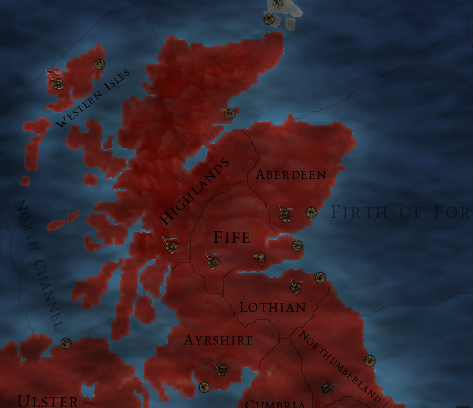
Baws.
@ RGB : And who could? Had I a cool million or twenty I'd have bought St Mirren years ago (though judging by how well I run an EUIII country, we'd probably be bottom of Division 2, up to our eyeballs in debt and surrounded by frenzied supporters baying for our blood...
@ All: Episodes X and XI were actually played in one gaming session spanning about fifteen years. There was actually a Horde truce in the last update but I left it out (they accepted a Concede immediately, probably because they were busy with the Ottomans).
And I have a disclaimer to make: I did slightly hamstring the Horde by changing the National Idea, thus reducing their Stability. The actual change of Idea (Military Drill to Glorious Arms) made more sense to me anyway (drilled Hordes seemed weird to me, but I imagine them telling great tales of their martial prowess) and...actually, I think it benefitted them anyway (I can explain why later if people are interested). The main difference was the Stability hit, which I assume was responsible for the increased number of rebels they start to face. They still stomp them flat pretty quickly, but at least they're having to work slightly harder to keep things together.
I won't spoil any more, I felt that I had to get that disclaimer out of the way now in the interests of honesty. I did it so that they would actually face something like the amount of rebels that they should have the deal with...they're still bastards, though...
@ Omen : Glad you're enjoying it, though clearly you are easily amused
@ Extreme Unction : Good to know
@ morningSIDEr : You gave me the idea for the character...and upon reading abit more about him, discovered that the totally unrelated modern-day Vladimir Romanov is, in fact, a Tverian! Explains a lot.
And Scotland was the natural nation for Tver to look to for inspiration, a small but proud nation valiantly holding out against a larger ene...

Baws.
@ RGB : And who could? Had I a cool million or twenty I'd have bought St Mirren years ago (though judging by how well I run an EUIII country, we'd probably be bottom of Division 2, up to our eyeballs in debt and surrounded by frenzied supporters baying for our blood...
@ All: Episodes X and XI were actually played in one gaming session spanning about fifteen years. There was actually a Horde truce in the last update but I left it out (they accepted a Concede immediately, probably because they were busy with the Ottomans).
And I have a disclaimer to make: I did slightly hamstring the Horde by changing the National Idea, thus reducing their Stability. The actual change of Idea (Military Drill to Glorious Arms) made more sense to me anyway (drilled Hordes seemed weird to me, but I imagine them telling great tales of their martial prowess) and...actually, I think it benefitted them anyway (I can explain why later if people are interested). The main difference was the Stability hit, which I assume was responsible for the increased number of rebels they start to face. They still stomp them flat pretty quickly, but at least they're having to work slightly harder to keep things together.
I won't spoil any more, I felt that I had to get that disclaimer out of the way now in the interests of honesty. I did it so that they would actually face something like the amount of rebels that they should have the deal with...they're still bastards, though...
Last edited:
@ Extreme Unction : Good to knowI'm still learning a lot about this game (as you can probably guess frm some of my war results!). I suppose I find it difficult to get myself to consider tribute, since I dislike bullies getting rewards for what they do, but there are certainly times when I would have been happy to pay a Tribute that I could afford. My income's still pretty low, though, and tribute could have crippled me.
Don't think of it as rewarding them for bad behavior. Think of it as luring them into a false sense of security while you gear your nation to their final and inevitable defeat.
Because unless they change their government type (which they almost certainly wont if controlled by the AI), they're stuck with Land Tech 3 units, even if their Land Tech is higher.
I finally declared war on them when I hit Land Tech 18 and had Eastern Musketeers. I sent my army through their territory in stacks of 10 regiments each. And 10-regiment stacks of Land Tech 18 units will destroy Land Tech 3 stacks twice their size.
I hadn't even modernized my military. I was still using Eastern units. And it was a total bloodbath. I destroyed their entire army. And then I occupied all of their territories (of which there were probably two dozen at the time) and kept them on complete lockdown for about 30 years while I slowly colonized each and every one.
Of course, if you can't afford it, you can't afford it. But if they offer you low monthly payments to leave you alone, I'd seriously suggest taking it. Get a Master of the Mint and mint some money to stay in the black if you have to. It's worth not having to deal with them every 5 years, especially when you're a lot weaker than they are.
Last edited:
Episode XI: The Tver Is Mightier Than The Horde
As the end of the truce with the Golden Horde drew nearer, good news reached Aleksandr. While the Horde was still a hugely dangerous foe- they had lost thousands of troops to the Ottomans but still fielded well in excess of fifty thousand men – they were preoccupied further to the east, dealing with rebel uprisings caused both by the recent death of their Khan, and by malcontents and troublemakers hired by Vladimirov’s underhand dealings. All was not well in Sarai and, while his armies were still hugely outnumbered, Aleksandr saw an opportunity to make a name for himself. He did not have his father’s love of, or skill in, warfare, but he had weighed the options and decided that the risk was worthwhile.
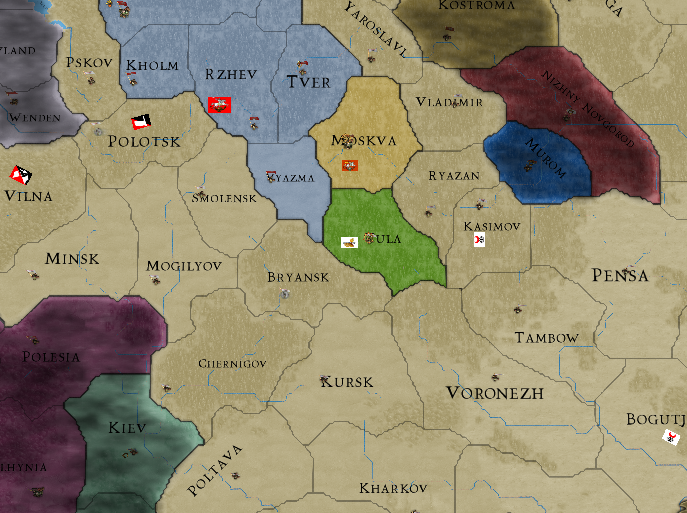
The fateful day came: five years of truce were up . The last time Aleksandr had sent an immediate request for extension – the Horde were happy to accept, being busy with the Ottomans, and Aleksandr did not share his father’s misgivings about such concessions. They cost no money, and when his military advisors pointed to the loss of Prestige, he had sighed. Prestige too, he admonished them, cost no money. Young Aleksandr III was a man who worked in solid results.
This time, though, circumstances were different. The armies were larger than they had ever been, well-equipped with weapons from new foundries in Tver and Rzhev. The die was cast: this time, Tver would fight.
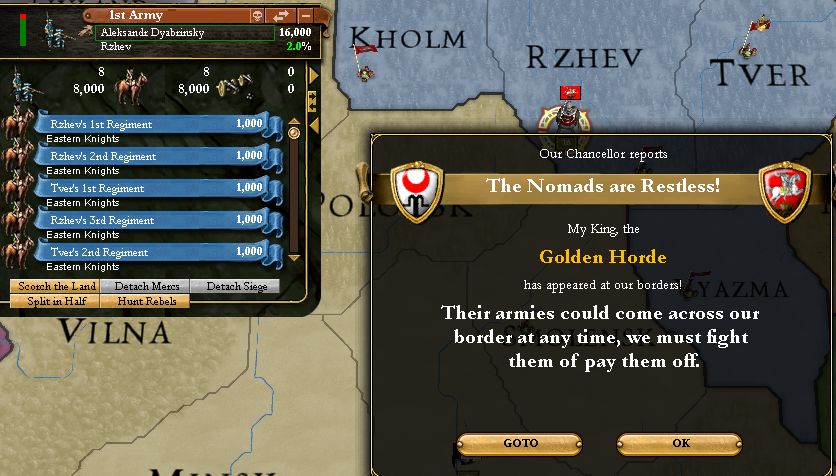
Eager to help his son-in-law, the King of Sweden helped to bankroll the Tverian war effort. Vladimirov made sure than at least 40% was used for the purposes for which they were intended, investing the remainder in strong alcohol, Venetian hedge-fund schemes and overhyped Lithuanian midfielders. Mercenaries. Slip of the quill.
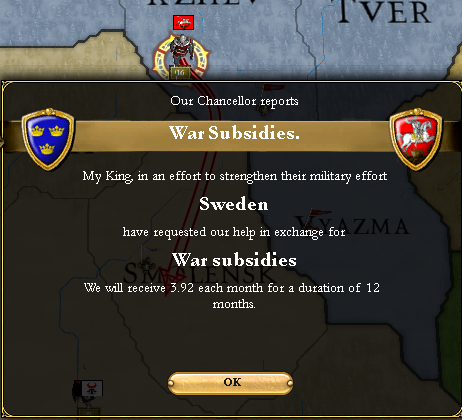
For the first time in the Principality’s history, the army of Tver was not to be commanded against the heathen by the king. General Dyabrinsky led the army onto the field, banners fluttering in the morning breeze. He had learned much of the art of warfare from Dobczyński, and would now be classified by most observers as ‘semi-competent’, although Dobczyński’s addition of a cape to his uniform had almost resulted in his death by self-strangulation, his life having been saved by a passing servant. Plus, Aleksandr had paid his fee, and had decided that he might as well make use of him.
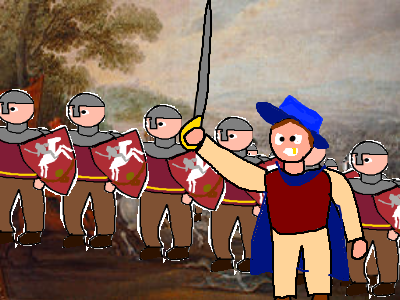
The armies of the Horde were marching towards them. While distracted by rebels, the force being sent towards the Tverians was considerably larger. Split into several armies of between twelve and sixteen thousands troops, their generals vaied in ability, but all were experienced commanders – much more so than Dyabrinsky (who would not always have Dobczyński around to keep him on the straight and narrow. The most terrifying of all was Baraq Surenchar, a huge, powerfully built monstrosity with a violet helmet – shocking – and a flaming moustache of considerable fieryness. Truly the armies of Tver would face a terrible test.
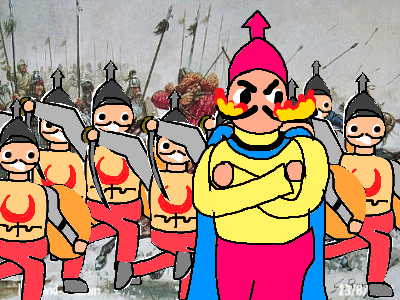
The Tverians moved quickly, crossing the border into Horde territory and heading fort he town of Smoleńsk, whose capture had been the objective of the King’s grandfather, Mikhael II, almost eighty years ago. If they were to take territory, the army was under strict orders to begin with Smoleńsk and complete the old king’s legacy.
The siege was short, as the Russian people of Smoleńsk overpowered the defenders and opened the gates for the Tverian army. Hearing the news, Vladimirov immediately began to release funds for the treasury for colonisation projects. Colonisation, even over a matter of a hundred kilometres, was an expensive business: each wave cost the Principality over 27 million ducats, and funds were running short. Had it not been for the Swedes, securing the town would have been impossible. However, caravans of settlers began to cross from Tver, encouraged to start a new life in Smoleńsk, arriving in their hundreds to new homes and farms.
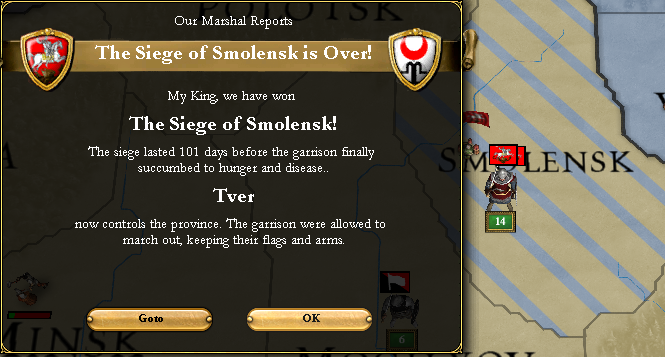
There was to be little respite fort he Tverians, however, as a large Horde army approached Smoleńsk from the south. With Dobczyński absent, General Dyabrinsky assembled his men outside the city, and put into action a manoeuvre taught to him by his mentor, General Livingston, ten years ago.
The results were devastating.
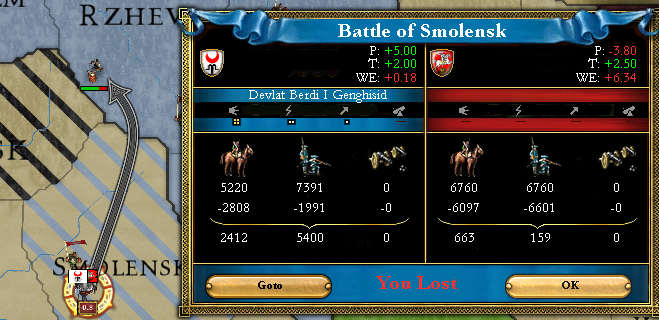
To the Tverian war effort. They retreated back to Vyazma, expecting the Horde to try and re-take the city. As they recovered their strength, though, they received strange but very welcome news.
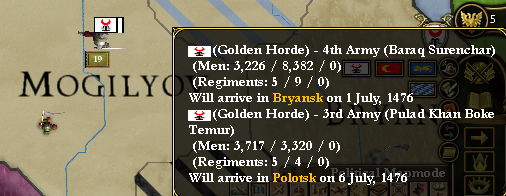
The enemy was moving south, not besieging the city. Apparently, they had not discovered the Tverian plan, had made no efforts to hunt down settlers and baggage trains. More and more Tverians arrived in the town, unmolested.
The next report to reach Aleksandr’s palace in Tver was not just one that he had looked forward to – but one his father and grandfather had also dreamed of.
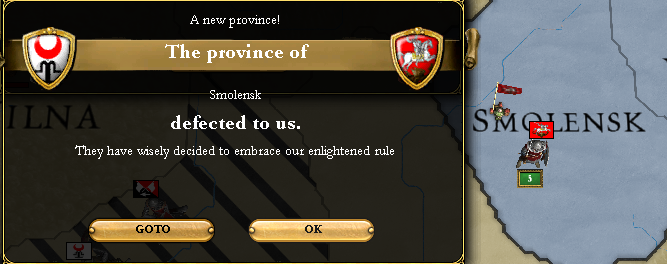
Smoleńsk was theirs. The town was under complete Tverian control, citizens greeting their new overlords as brother Russians. All traces of the Horde had been driven out. The city was now an integral part of the Principality of Tver.

A letter of goodwill and congratulations arrived from his father-in-law a week later, with a very sensible and unbiased suggestion for a new objective.
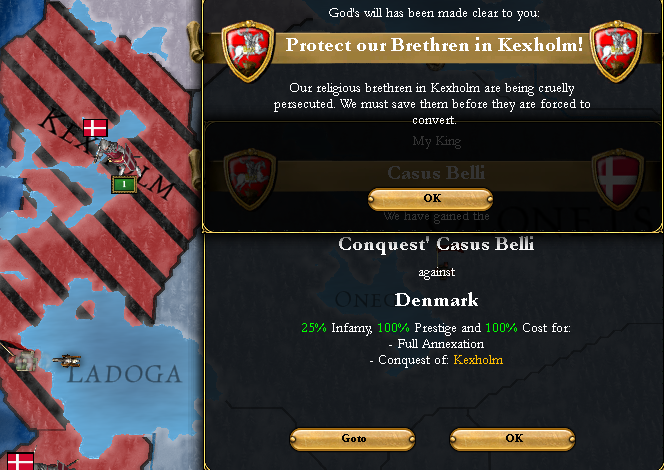
That was – or probably wasn’t – for the future, however. The Tverian army was split into two parts, one commanded by Dyabrinsky and the other by Dobczyński. This was partly to ensure tactical flexibility, and partly to ensure that only half of their troops were being led by a loon. Both detachments, however, were now sent north, towards the city of Polotsk upon which the Tverian cartographers had made a strong claim. This city, too, would likely accept Tverian rule swiftly, if they were able to take it and replenish its population.
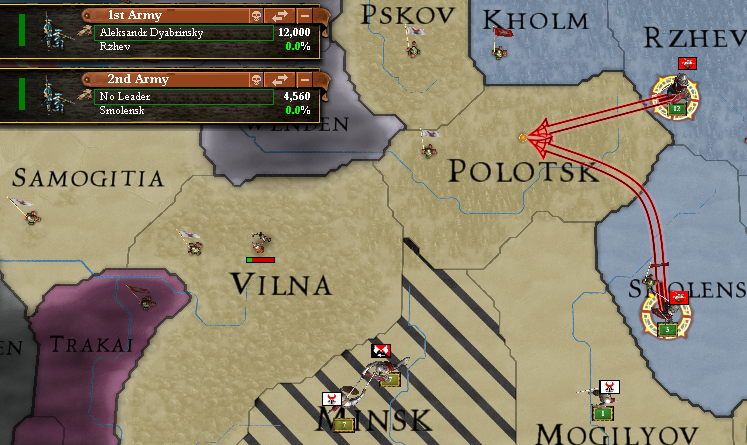
Once again, success came swiftly, as the defenders surrendered to Dobczyński’s terms.
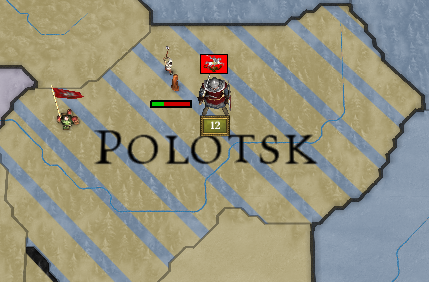
More Swedish-backed colonisation effort were made. The war had run into its fourth year, and the treasury was at its limits, but the Horde’s armies were slow to respond to the threat, battling rebel uprisings in its Lithuanian and Belorussian territories. Eventually, in a joyful letter to Aleksandr, the city’s governor declared Polotsk integrated into the Principality.
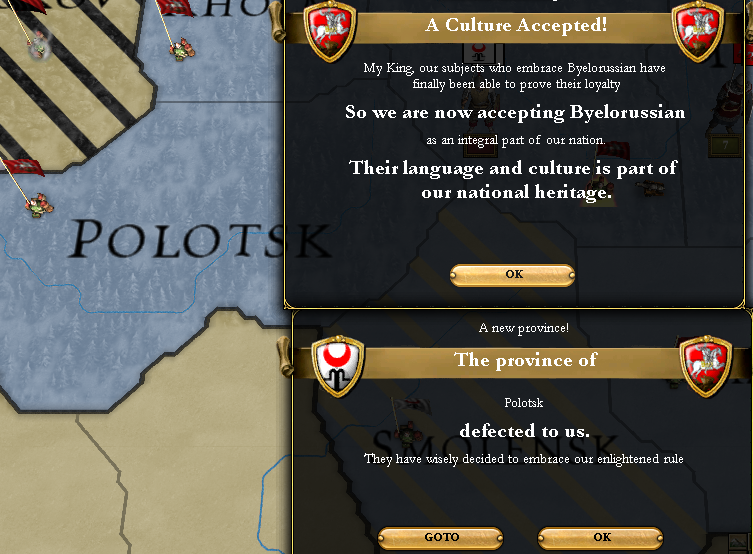
His generals clamoured for more, but Aleksandr was cautious. The Horde’s armies were moving in, money was running out – and they had got what they wanted.
The Horde attacked Dyabrinsky’s defensive position in Polotsk. With his greater numbers, the Tverian leader assumed that victory was his, until he was the enemy commander – the terrible Surenchar himself, his face wreathed in flame. Dozens of his soldiers fled before this heathen monster, sowing panic in the ranks, and soon the battle became a terrible, humiliating rout.
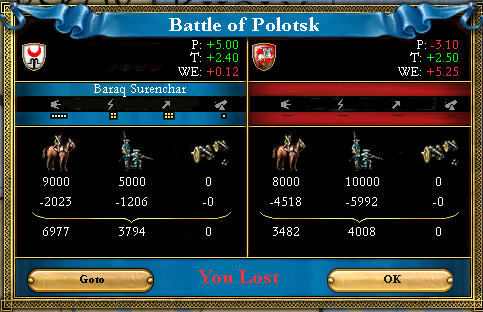
Aleksandr was infuriated with the General for not retreating – but if did not matter. He sent a rider to the Khan of the Horde offering to concede defeat. With fresh rebellions breaking out across their empire almost every month, the Tartars had little choice but to accept, leaving Tver with its newly-acquired cities. This was, perhaps, the most victorious defeat in the history of warfare.
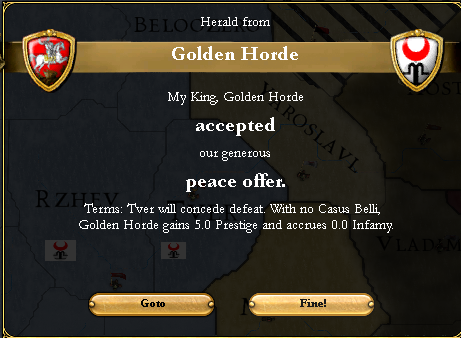
With the last of the Swedish war subsidies, Aleksandr III – at Dobczyński’s peruasion, for the king was loath to part with money unnecessarily – threw a great victory feast for his commanders, and some less glamorous events for their men.
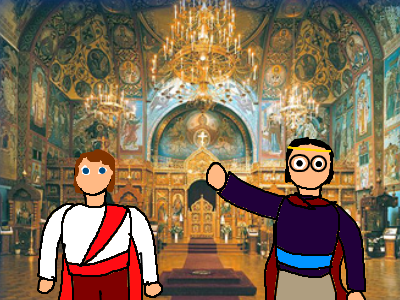
It was a time for great celebration. While they had been defeated on the battlefield at every step, they had shown not only themselves, but Christendom, that the Tartars were not invincible. And while there would be many battles and losses ahead against this terrible foe, the Tverians now believed that, little by little, the tide of heathen could be turned: and no nation would be better placed to profit from their demise than the Principality of Tver.
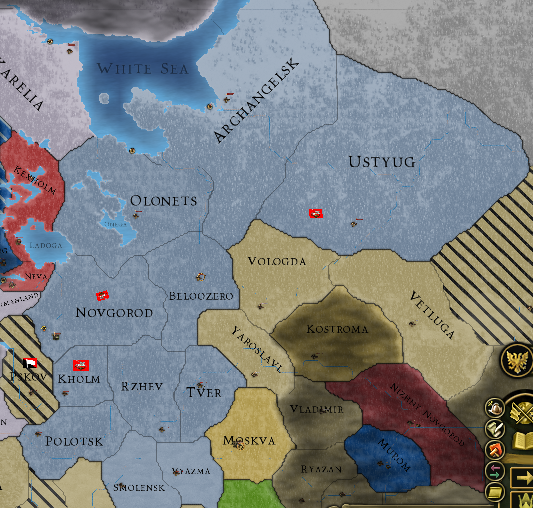
The victory was cheered in all parts of Christendom – save in the halls of cartographers. Further progress was needed to correct the nation’s appearance...
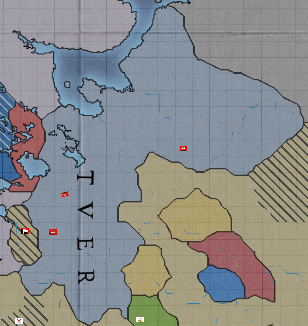
As the end of the truce with the Golden Horde drew nearer, good news reached Aleksandr. While the Horde was still a hugely dangerous foe- they had lost thousands of troops to the Ottomans but still fielded well in excess of fifty thousand men – they were preoccupied further to the east, dealing with rebel uprisings caused both by the recent death of their Khan, and by malcontents and troublemakers hired by Vladimirov’s underhand dealings. All was not well in Sarai and, while his armies were still hugely outnumbered, Aleksandr saw an opportunity to make a name for himself. He did not have his father’s love of, or skill in, warfare, but he had weighed the options and decided that the risk was worthwhile.

The fateful day came: five years of truce were up . The last time Aleksandr had sent an immediate request for extension – the Horde were happy to accept, being busy with the Ottomans, and Aleksandr did not share his father’s misgivings about such concessions. They cost no money, and when his military advisors pointed to the loss of Prestige, he had sighed. Prestige too, he admonished them, cost no money. Young Aleksandr III was a man who worked in solid results.
This time, though, circumstances were different. The armies were larger than they had ever been, well-equipped with weapons from new foundries in Tver and Rzhev. The die was cast: this time, Tver would fight.

Eager to help his son-in-law, the King of Sweden helped to bankroll the Tverian war effort. Vladimirov made sure than at least 40% was used for the purposes for which they were intended, investing the remainder in strong alcohol, Venetian hedge-fund schemes and overhyped Lithuanian midfielders. Mercenaries. Slip of the quill.

For the first time in the Principality’s history, the army of Tver was not to be commanded against the heathen by the king. General Dyabrinsky led the army onto the field, banners fluttering in the morning breeze. He had learned much of the art of warfare from Dobczyński, and would now be classified by most observers as ‘semi-competent’, although Dobczyński’s addition of a cape to his uniform had almost resulted in his death by self-strangulation, his life having been saved by a passing servant. Plus, Aleksandr had paid his fee, and had decided that he might as well make use of him.

The armies of the Horde were marching towards them. While distracted by rebels, the force being sent towards the Tverians was considerably larger. Split into several armies of between twelve and sixteen thousands troops, their generals vaied in ability, but all were experienced commanders – much more so than Dyabrinsky (who would not always have Dobczyński around to keep him on the straight and narrow. The most terrifying of all was Baraq Surenchar, a huge, powerfully built monstrosity with a violet helmet – shocking – and a flaming moustache of considerable fieryness. Truly the armies of Tver would face a terrible test.

The Tverians moved quickly, crossing the border into Horde territory and heading fort he town of Smoleńsk, whose capture had been the objective of the King’s grandfather, Mikhael II, almost eighty years ago. If they were to take territory, the army was under strict orders to begin with Smoleńsk and complete the old king’s legacy.
The siege was short, as the Russian people of Smoleńsk overpowered the defenders and opened the gates for the Tverian army. Hearing the news, Vladimirov immediately began to release funds for the treasury for colonisation projects. Colonisation, even over a matter of a hundred kilometres, was an expensive business: each wave cost the Principality over 27 million ducats, and funds were running short. Had it not been for the Swedes, securing the town would have been impossible. However, caravans of settlers began to cross from Tver, encouraged to start a new life in Smoleńsk, arriving in their hundreds to new homes and farms.

There was to be little respite fort he Tverians, however, as a large Horde army approached Smoleńsk from the south. With Dobczyński absent, General Dyabrinsky assembled his men outside the city, and put into action a manoeuvre taught to him by his mentor, General Livingston, ten years ago.
The results were devastating.

To the Tverian war effort. They retreated back to Vyazma, expecting the Horde to try and re-take the city. As they recovered their strength, though, they received strange but very welcome news.

The enemy was moving south, not besieging the city. Apparently, they had not discovered the Tverian plan, had made no efforts to hunt down settlers and baggage trains. More and more Tverians arrived in the town, unmolested.
The next report to reach Aleksandr’s palace in Tver was not just one that he had looked forward to – but one his father and grandfather had also dreamed of.

Smoleńsk was theirs. The town was under complete Tverian control, citizens greeting their new overlords as brother Russians. All traces of the Horde had been driven out. The city was now an integral part of the Principality of Tver.

A letter of goodwill and congratulations arrived from his father-in-law a week later, with a very sensible and unbiased suggestion for a new objective.

That was – or probably wasn’t – for the future, however. The Tverian army was split into two parts, one commanded by Dyabrinsky and the other by Dobczyński. This was partly to ensure tactical flexibility, and partly to ensure that only half of their troops were being led by a loon. Both detachments, however, were now sent north, towards the city of Polotsk upon which the Tverian cartographers had made a strong claim. This city, too, would likely accept Tverian rule swiftly, if they were able to take it and replenish its population.

Once again, success came swiftly, as the defenders surrendered to Dobczyński’s terms.

More Swedish-backed colonisation effort were made. The war had run into its fourth year, and the treasury was at its limits, but the Horde’s armies were slow to respond to the threat, battling rebel uprisings in its Lithuanian and Belorussian territories. Eventually, in a joyful letter to Aleksandr, the city’s governor declared Polotsk integrated into the Principality.

His generals clamoured for more, but Aleksandr was cautious. The Horde’s armies were moving in, money was running out – and they had got what they wanted.
The Horde attacked Dyabrinsky’s defensive position in Polotsk. With his greater numbers, the Tverian leader assumed that victory was his, until he was the enemy commander – the terrible Surenchar himself, his face wreathed in flame. Dozens of his soldiers fled before this heathen monster, sowing panic in the ranks, and soon the battle became a terrible, humiliating rout.

Aleksandr was infuriated with the General for not retreating – but if did not matter. He sent a rider to the Khan of the Horde offering to concede defeat. With fresh rebellions breaking out across their empire almost every month, the Tartars had little choice but to accept, leaving Tver with its newly-acquired cities. This was, perhaps, the most victorious defeat in the history of warfare.

With the last of the Swedish war subsidies, Aleksandr III – at Dobczyński’s peruasion, for the king was loath to part with money unnecessarily – threw a great victory feast for his commanders, and some less glamorous events for their men.

It was a time for great celebration. While they had been defeated on the battlefield at every step, they had shown not only themselves, but Christendom, that the Tartars were not invincible. And while there would be many battles and losses ahead against this terrible foe, the Tverians now believed that, little by little, the tide of heathen could be turned: and no nation would be better placed to profit from their demise than the Principality of Tver.

The victory was cheered in all parts of Christendom – save in the halls of cartographers. Further progress was needed to correct the nation’s appearance...

@ Omen : Glad you're enjoying it, though clearly you are easily amused
Aw man. Sick burn on you, and me! : )
I think even underhanded tactics like editing the save file is fair game against the mighty horde! Especially since it resulted in angry cartographers. Seriously, screw those guys.
Aw man. Sick burn on you, and me! : )
I think even underhanded tactics like editing the save file is fair game against the mighty horde! Especially since it resulted in angry cartographers. Seriously, screw those guys.
Heh. As I've said before, I was sorely tempted to go that far or further, though I would have felt a bit guilty if I'd got the favourable result that I managed in this fight after doing any more serious meddling. I got lucky, though: I had an urge to delete half their regiments, but it looks like the Ottos did that for me! I couldn't see the war so I don't know how it happened: all I do know is that they dropped from 100k + troops to less than 60. As you see, though, they still won every battle, even in a war which I 'won'.
For this reason, I view this episode as a great victory, certainly, but not one that crushes the Horde or anything of the sort. They can still field five times as many troops as me and, if they get their act together and can play rebel Whack-a-Mole successfully, they'll still be a formidable opponent. I don't think I've beaten them in open combat in the entire game. It's not just the size of their forces that is terrifying: because they spend almost all their time fighting, their generals are absolute maniacs.
It's a battle won, certainly - but Tver v Horde is far from over...

